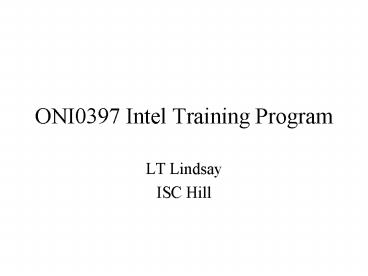ONI0397 Intel Training Program
1 / 24
Title: ONI0397 Intel Training Program
1
ONI0397 Intel Training Program
- LT Lindsay
- ISC Hill
2
ITP Objectives
- Refresh supplement NBIT(BRIT)/NIOBC
- Sharpen analysis presentation skills
- Develop shared awareness of unit activities
- Develop shared awareness of and leverage civilian
expertise
3
ITP Plan
- One division each month
- Provide analytical overview/update of production,
or - Nominate member to apply civilian expertise to
intel issue , or - Other substantive or methodological intel topic
- One hour brief on Sunday morning
- Emphasis on framing questions predictions, not
mechanical PowerPoint briefing - Informal, non-evaluated, workshop atmosphere
4
ITP Schedule
- FEB ITP Overview Intel Methodology (LT Lindsay
ISC Hill) - MAR China (LT Lindsay ISC Hill)
- APR TBD
- MAY TBD
- JUN TBD
- AUG TBD
5
IntelligenceMethodology
6
(No Transcript)
7
The Basic Intel Problem
Reality
False
True
False Positive (ex Iraq WMD)
True
Assessment
False Negative (ex 9/11)
False
8
Overview
- Obstacles to Accuracy
- Cognitive
- Organizational
- Critical Thinking
9
Cognitive Biases
- Fixity of belief
- New information assimilated to existing images
- Confirmation bias
- Ignore/discount disconfirming evidence
- Incremental Interpretation
- More data ? more confidence, not more accuracy
- Satisficing
- First available answer/analogy, rather than
systematic search evaluation - Framing (Prospect)
- Presentation influences judgment
10
Cognitive-Social Biases
- False confidence
- Im an expert, nothing surprises me
- Attribution Error
- We respond to accidental circumstances They
act intentionally - Their behavior is coordinated, centralized,
intentional - Our effort ? their good behavior Their
character ? their bad behavior - Shared Information
- They know what we know
- Mirror Imaging/Ethnocentrism
- They think and act like us
11
Intel Cost/Value
Open Source
Secret
Value added
Cost/effort
12
Organizational Problems
- Consistency Bias
- Classification ? Selection Bias
- Complexity
- Sharing, Communication
- Circular Reporting
- Time Constraints
- Short Term Horizon
- Current Production
- Measures of Effectiveness
- Quantity over Quality
- Consensus
- Oversupply
- Politicization
13
So many problems, so what?
14
From Tradecraft to Method
- Make Assumptions Hypotheses Explicit
- Are there alternative explanations?
- Let a hundred flowers bloom.
- Infer Predictions
- Imagine key assumption is 100 falsehow could
this be? - Test Predictions
- Collection, Analysis
- Assess
- How sensitive is conclusion to change in
variables?
15
Strong v. Weak Evidence
Certain (Explanation definitely predicts)
Yes
No
Yes
Decisive
Smoking Gun
Unique (no other explanation)
Circumstantial
Hoop Test
No
16
The Intelligence Cycle Were Taught
Ops Requirements
Ops Feedback
Collection
Dissemination
Analysis
Production
17
The Real Intelligence Cycle
Intel infers needs
Ops receives reacts
Task Collection
?
Dissemination
Raw intel
Analysis Production
Treverton 2001
18
Know Thy Operator
- Dont wait for requirements
- Get out of the SCIF
- Find out what information matters why
- Always speak the truth
19
Summary Intelligence Integrity
- Be relevant
- Be vigilant against bias
- Be critical seek alternative explanations, hard
tests
20
Questions?
21
Further Reading
- Herman, Michael. 1996. Intelligence Power in
Peace and War. Cambridge Cambridge University
Press. - Heuer, Richards J. 1999. Psychology of
Intelligence Analysis. Center For the Study of
Intelligence. - Jervis, Robert. 1976. Perception and
Misperception in International Politics.
Princeton University Press. - Johnston, Rob. 2005. Analytic Culture in the US
Intelligence Community an Ethnographic Study.
Washington, DC Center For the Study of
Intelligence. - Lowenthal, Mark M. 2000. Intelligence From
Secrets to Policy. Washington DC CQPress. - Treverton, Gregory F. 2001. Reshaping National
Intelligence in an Age of Information. Cambridge
Cambridge University Press. - Van Evera, Stephen W. 1997. Guide to Methods For
Students of Political Science. Ithaca, NY
Cornell University Press.
22
Hypothesis
Dependent Variable
Independent Variable
Intervening Variable
Condition Variable
Condition Variable
23
Secrecy v. Effectiveness
Analysis
CI
Effectiveness
Secrecy
Sec
24
(No Transcript)































